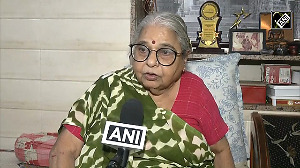The spotlight is again back on Virender Sehwag after a dazzling showing with the bat in New Zealand. One was just wondering about the interview post the 60-ball hundred against the Kiwis.
'Nothing has changed,' said Sehwag. 'I still play 70-75 balls and score 100 runs.'
No longer a clone of Tendulkar, more mature and at the prime of his ability, Sehwag now is realizing the potential he displayed at Bloemfontein, with a ton on debut.
Test cricket has never been a grey area for the Nawab of Najafgarh; he has not only scored runs, but also was instrumental in setting up Indian wins.
However, the one-day variety is where he was not delivering the goods. Bowlers around the world then would target him with back-of-length deliveries, about hip height, and he would find it difficult to rotate the strike.
As a consequence, he would get frustrated and, in the process, lose his wicket.
Not any more! In the last 20 innings, he has averaged an astounding 60.58, with a strike rate in excess of 100.
So what has really changed since the match-saving 151 against the Australians at Adelaide Oval in 2008?
Is the quality of the bowlers declining? Have they stopped bouncing Sehwag? Are they lacking genuine pace or have the decks being flat?
Sure, none of the aforementioned have ceased. Sehwag is inching towards, 'a complete batsman', extending his array of strokes.
Napier, Wellington, and Hamilton corroborates that Sehwag appears to have added a few more arrows in his quiver.
Slowly away from the of the media glare, there is a conscious effort to add new shots to the repertoire. It is a well-acknowledged fact that Sehwag has problems with the line of delivery aimed around the rib cage area and just short of length.
Earlier in the Test series against England, one saw him fending the barrage of short pitched deliveries in fashion that would encourage opposition skippers keeping a forward short leg.
With the horizontal bat shot now added, he compels the bowlers to alter their line of attack and force them to switch to pitch the ball up to drive.
Coach Gary Kirsten must get his due for facilitating the process. This is in stark contrast to former coach Greg Chappell's approach of asking the seasoned players to alter the game and in the name of 'stretching', creating anxiety in the team.
Batsman come in all flavours, the accumulators, the destroyers, the adaptors, the flaired ones, but Sehwag is unique with an eye to siege opportunity in every delivery and quickly forgetting what happened on the last delivery .
One of the significant fulcrums of India's current success, Sehwag has taken strides towards greatness in Test cricket. But, as a pure batsman, he had yet to attain completeness, in terms stamping his authority on all the three versions of the game.
The opener's brilliance has never been in doubt. However, with the team management and coach instilling the confidence in him, given a free hand, he is fast bridging the gap between expected and actual results.
The evolution has been a steady one but the biggest challenges remains in getting big scores in the 50-50 version of the game consistently, apart from maintaining the fitness. They say that the a batsman matures and plays his best game when he is around 28-30 years.
Sehwag clearly is at his acme now.






